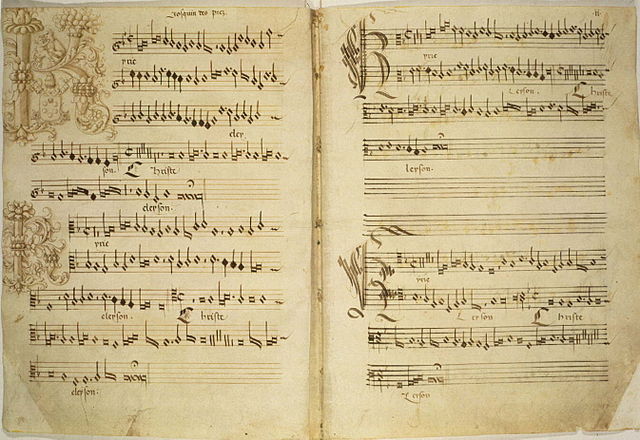Loyset Compère was a Franco-Flemish composer of the Renaissance. Of the same generation as Josquin des Prez, he was one of the most significant composers of motets and chansons of that era, and one of the first musicians to bring the light Italianate Renaissance style to France.
Manuscript of Omnium bonorum plena, a motet by Compère, and possibly his earliest surviving work; the exact date is uncertain, but it was possibly written for the dedication of Cambrai Cathedral on 2 July 1472.
Josquin Lebloitte dit des Prez was a composer of High Renaissance music, who is variously described as French or Franco-Flemish. Considered one of the greatest composers of the Renaissance, he was a central figure of the Franco-Flemish School and had a profound influence on the music of 16th-century Europe. Building on the work of his predecessors Guillaume Du Fay and Johannes Ockeghem, he developed a complex style of expressive—and often imitative—movement between independent voices (polyphony) which informs much of his work. He further emphasized the relationship between text and music, and departed from the early Renaissance tendency towards lengthy melismatic lines on a single syllable, preferring to use shorter, repeated motifs between voices. Josquin was a singer, and his compositions are mainly vocal. They include masses, motets and secular chansons.

A 1611 woodcut of Josquin des Prez, possibly copied from a now-lost oil painting made during his lifetime. There have been doubts concerning whether this depiction is an accurate likeness, see § Portraits.
Josquin probably served under Louis XII, who had captured the Sforzas, his previous employers.
Ercole I d'Este, an important patron of the arts, was Josquin's employer during 1503–1504.
Manuscript showing the opening Kyrie of the Missa de Beata Virgine, a late work. Rome, Biblioteca Apostolica Vaticana, Capp. Sist. 45, ff. 1v-2r.





